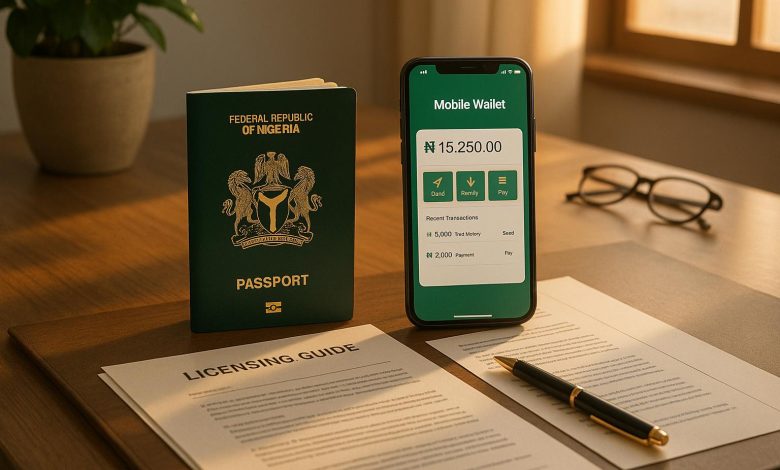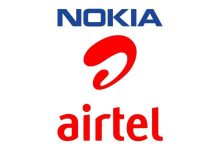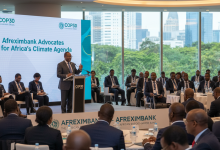Nigeria’s Mobile Wallet Licensing Guide

To operate a mobile wallet service in Nigeria, you must secure a Mobile Money Operator (MMO) license from the Central Bank of Nigeria (CBN). This license is mandatory for legally managing customer funds and offering services like transfers, bill payments, and merchant transactions.
Here’s what you need to know:
- Capital Requirement: ₦2 billion in paid-up share capital and an additional ₦2 billion escrow deposit with the CBN.
- Process Timeline: The licensing process typically takes 8–13 months but can extend to 18–24 months.
- Application Phases: Approval-in-Principle (AIP) and Final License Approval.
- Compliance: Regular reporting, strict Know Your Customer (KYC) processes, cybersecurity standards, and annual audits are required.
- Penalties for Non-Compliance: Fines, license suspension, or revocation for violations.
The CBN enforces strict guidelines to ensure operators meet high financial and technical standards, safeguarding consumers and Nigeria’s financial system.
Keep reading for a detailed breakdown of the application process, compliance requirements, and how to avoid common pitfalls.
Complete Guide to CBN Licenses for Nigerian Fintech Startups
Mobile Money Operator (MMO) License Basics
The Mobile Money Operator (MMO) license is the official approval needed to run mobile wallet services in Nigeria. It’s your ticket to legally managing customer funds through digital platforms. For businesses aiming to tap into Nigeria’s mobile financial services market, obtaining this license is non-negotiable. Let’s break down why this license matters and how the Central Bank of Nigeria (CBN) oversees its framework.
The CBN introduced the MMO licensing framework as part of its push to improve financial inclusion across the country. This license allows operators to offer services like peer-to-peer transfers, bill payments, airtime purchases, and merchant payments – all through mobile devices. Unlike traditional banking licenses, the MMO license focuses exclusively on digital financial services, eliminating the need for physical branches.
Why You Need an MMO License
Operating mobile wallet services in Nigeria without the proper license isn’t just risky – it’s illegal. The CBN strictly enforces these regulations, and businesses caught operating without an MMO license face severe consequences, including shutdowns, hefty fines, and even criminal charges for their executives.
But it’s not just about staying on the right side of the law. The MMO license ensures that only financially sound and technically capable organizations handle customer funds. This safeguards consumers from potential losses due to fraud or operational failures. Additionally, the license plays a key role in advancing Nigeria’s financial inclusion agenda, helping underserved communities gain better access to financial services.
Licensed operators also gain direct access to the Nigeria Inter-Bank Settlement System (NIBSS). This integration allows seamless transactions between mobile wallets and bank accounts, creating a more connected and efficient financial ecosystem. However, meeting the CBN’s standards requires strict compliance with its operational and technological guidelines.
CBN’s Rules and Guidelines
The CBN uses a risk-based regulatory approach to oversee mobile money services, tailoring its oversight based on the potential risks to the financial system and consumers.
One major area of regulation is customer identification and verification. Wallet users must go through Know Your Customer (KYC) processes, which determine their transaction limits. For example, basic KYC typically comes with lower daily transaction limits, while enhanced KYC allows for higher thresholds.
MMO license holders must also submit detailed monthly reports to the CBN. These reports cover transaction volumes, customer demographics, fraud incidents, and system performance metrics. To ensure compliance, the CBN conducts regular supervisory checks, with higher-risk operators facing more frequent reviews to assess their adherence to guidelines, financial stability, and risk management practices.
Technology and security are also critical components of the regulatory framework. Operators must meet stringent cybersecurity standards, including data encryption, secure authentication, and well-defined incident response protocols. Annual security audits by approved third-party firms are mandatory to ensure ongoing compliance. For operators that rely on agents for cash-in and cash-out services, there are strict requirements for agent selection, training, and monitoring. Agents must also be registered and comply with anti-money laundering regulations.
Eligibility and Capital Requirements
Securing a Mobile Money Operator (MMO) license in Nigeria requires meeting the stringent capital standards set by the Central Bank of Nigeria (CBN). These financial requirements are designed to ensure applicants have the stability needed to operate effectively.
Required Capital Amount
Applicants are required to maintain a minimum issued share capital of ₦2,000,000,000, which must remain free from any encumbrances such as losses. Additionally, they must place a refundable escrow deposit of ₦2,000,000,000 into the CBN PSP Share Capital account. Altogether, this means an initial financial commitment of ₦4,000,000,000 is necessary. This substantial capital requirement forms a key part of the licensing process.
sbb-itb-dd089af
How to Apply for an MMO License
Applying for a Mobile Money Operator (MMO) license with the Central Bank of Nigeria (CBN) involves a detailed, two-phase process. Here’s what you need to know to navigate it successfully.
Application Steps
The CBN breaks down the MMO licensing process into two stages: Approval-in-Principle (AIP) and Final License Approval.
In the AIP phase, you’ll need to submit a complete application package. This includes your business plan, technical proposals, and details about your management team to demonstrate compliance with CBN’s regulatory standards. Once you secure the AIP, the focus shifts to the Final License phase, where you’ll need to showcase your system setups and operational processes to prove readiness.
Throughout both stages, collaboration with CBN officials is essential. Be prepared to respond promptly to their questions and provide any additional documentation they request. It’s also common for the CBN to recommend adjustments to your business model or operational systems based on their evaluations.
Fees and Processing Time
The processing time for an MMO license generally falls between 8 and 13 months, though it can stretch to 18 to 24 months for more complex or incomplete applications.
Mistakes to Avoid
To improve your chances of success, steer clear of these common pitfalls:
- Incomplete or inaccurate submissions: Ensure your application is thorough and up-to-date. Missing details – especially around technical specs or risk management – can cause significant delays or outright rejection.
- Weak technology infrastructure: Your systems must be robust enough to handle transaction volumes securely and protect sensitive data.
- Poor financial planning: Accurately budget for both operational and regulatory costs. Additionally, present a management team with strong experience in financial services, technology, and compliance.
- Rushing the process: Take the time to fully understand CBN’s guidelines. Work with qualified legal and technical advisors to prepare comprehensive and detailed documentation. A well-prepared application can save you from unnecessary delays and revisions.
Compliance Requirements After Approval
Getting your MMO license is just the beginning. Once approved, you’ll need to stay on top of ongoing compliance requirements set by the Central Bank of Nigeria (CBN). These rules ensure your mobile wallet operations remain both legal and efficient. And one thing is certain: accurate and timely reporting is non-negotiable.
Monthly Reports and Deadlines
Your compliance journey kicks off right after you secure your license, with specific reporting duties tied to weekly, monthly, and annual schedules:
- Weekly Returns: You’re required to reconcile daily balances in your pool accounts and send these figures to the designated CBN department. Daily reconciliations are key to meeting this requirement.
- Monthly Reports: By the 14th of each month, you must submit a detailed report covering the nature, value, and volume of all transactions processed on your platform. This report should also document customer complaints and any fraud incidents. If you’re a non-bank MMO, you’ll need to include a performance assessment report in the prescribed format as well.
- Annual Returns: Audited financial reports are due by March 31, three months after the year-end. Along with these, you must submit your External Auditor’s Report, which reviews your Business Continuity Plan. Both are required by the same March 31 deadline.
Missing these deadlines isn’t just a minor oversight – it can lead to serious consequences.
Penalties for Non-Compliance
Failing to meet CBN’s compliance standards can result in hefty penalties:
- Fines: A breach in customer due diligence could cost up to ₦1 million, while data privacy violations could result in fines as high as ₦10 million.
- License Risks: Repeated or severe failures may lead to the suspension or even revocation of your license. Persistent non-compliance can result in license revocation within 12 to 18 months.
- Criminal Liability: Failure to report suspicious transactions tied to anti-money laundering regulations could lead to criminal prosecution. Beyond that, the CBN Governor has the authority to impose additional financial penalties, and officers responsible for violations may face administrative sanctions.
“These Guidelines are very far reaching and have severe sanctions for non-compliance. MMOs should therefore ensure compliance with the provisions of the Guidelines and Framework.” – Goldsmiths LLP
Enforcement actions by the CBN and the Economic and Financial Crimes Commission have ramped up since 2022, reflecting a stronger push for accountability across Nigeria’s financial sector.
Technology Updates Required
Staying compliant also means keeping your technology up to date. The CBN requires annual third-party security audits to ensure your systems meet strict cybersecurity standards, including data encryption and incident response protocols.
Operators must promptly implement security patches and maintain backup systems capable of handling high transaction volumes. Any major system changes must first be approved by the CBN to confirm they meet regulatory standards.
In addition, regular penetration testing and vulnerability assessments are mandatory. These measures help identify and address security risks, ensuring the protection of customer data and maintaining the transaction reliability that the CBN demands for continued licensing.
Key Points for MMO License Applicants
To strengthen your MMO license application, focus on these essential aspects to align with CBN’s stringent requirements and showcase secure, compliant mobile wallet operations.
Capital requirements are non-negotiable. You must have ₦2 billion in paid-up capital that is fully documented and deposited in a CBN-approved escrow account. Funds must be traceable to legitimate sources, and borrowed or unguaranteed funds are likely to lead to rejection. Proper documentation is key to proving the legitimacy of your capital.
The CBN places significant emphasis on your management team’s expertise. Your board and executive team must demonstrate a strong track record in financial services and mobile payments. Additionally, key personnel must pass fit-and-proper person certifications to meet regulatory standards.
High-quality documentation is critical. Submit a complete and professionally prepared application package. This should include a well-detailed business plan, IT policies, risk management frameworks, and all necessary corporate documents. Incomplete or poorly presented applications often face delays or rejection.
Your application must clearly define a mobile-first strategy. Highlight plans for USSD integration, robust agent networks, and compatibility with feature phones. Weak or vague strategies in this area are a common reason for failed applications.
Every detail matters. Missing even one required document can cause significant delays. As Nigeria’s mobile wallet market continues to expand, only applicants who meet CBN’s rigorous standards will gain approval and thrive in this competitive space.
FAQs
What challenges do businesses face when applying for a Mobile Money Operator (MMO) license in Nigeria?
Businesses seeking an MMO license in Nigeria face several notable challenges. One of the biggest obstacles is the extended approval timeline, which can stretch between 6 to 8 months, testing both patience and planning.
Another significant barrier is the steep capital requirement – a hefty $13,000,000 (₦5 billion). For many companies, this financial demand can be a tough hurdle to overcome.
On top of that, there’s the complex regulatory framework to navigate. The Central Bank of Nigeria (CBN) enforces strict and evolving guidelines, requiring meticulous compliance and multiple prior approvals. Together, these factors make obtaining an MMO license a process that demands considerable time, effort, and resources.
How does the Central Bank of Nigeria ensure mobile wallet providers are secure and compliant?
The Central Bank of Nigeria (CBN) has implemented strict measures to ensure mobile wallet providers operate safely and meet regulatory requirements. Providers must adhere to strict security protocols, including PCI DSS Level 1, to safeguard user data and combat fraud. Every transaction is required to be fully traceable and auditable.
To strengthen security, the CBN mandates thorough Know Your Customer (KYC) and Anti-Money Laundering (AML) practices. These include steps like biometric verification and automated risk assessments. On top of that, mobile wallet operators must comply with cybersecurity guidelines that emphasize continuous monitoring, risk management, and strong governance systems to protect financial services effectively.
What happens if mobile wallet operators in Nigeria fail to comply with Central Bank regulations?
Mobile wallet operators in Nigeria must adhere strictly to the regulations set by the Central Bank of Nigeria (CBN) or face serious repercussions. These penalties include weekly fines of ₦50,000 for non-compliance, being held fully responsible for any fraudulent transactions, and the possibility of having their operating licenses suspended or revoked.
The impact of these penalties can be severe. They can disrupt business operations, damage a company’s reputation, and lead to significant financial losses. For example, some operators have been fined hundreds of millions of naira for running their services without the proper licenses. To steer clear of such risks, it’s crucial for all mobile wallet operators to comply fully with CBN’s guidelines.









